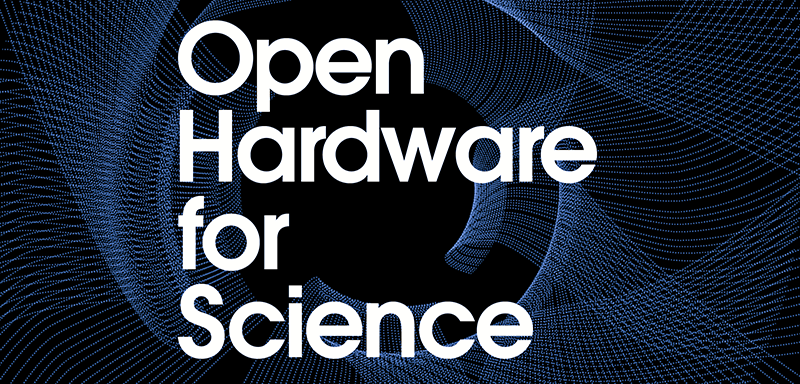Scientific equipment is expensive. It can cost hundreds of thousands of dollars to set up a lab. Simply the cost of machines, like data acquisition units or even a simple load cell, can cost hundreds of dollars. This makes research cost prohibitive, and that’s the case even if you do spend a dozen hours a week writing grant proposals. Citizen science is right out, because the cost of the tools to do science is so high.
 For this week’s Hack Chat, we’re going to be talking about Open Hardware for science. This is the chat that’s all about Open Source equipment, hardware modular electronics, and Open designs to make the tools that make science.
For this week’s Hack Chat, we’re going to be talking about Open Hardware for science. This is the chat that’s all about Open Source equipment, hardware modular electronics, and Open designs to make the tools that make science.
Our guest for this week’s Hack Chat is [Dr. Alexxai Kravitz]. He has a PhD in Neuroscience from UPenn and completed a postdoc at the Gladstone Institutes in San Fransisco. [Lex]’s research focuses on understanding the reward circuitry in the brain, and his publications use a variety of experiments to examine this, including behavioral testing, in vivo electrophysiology, and optogenetics.
For this Hack Chat, we’re going to about how Open Source has made more science possible. Of note, we’ll be discussing:
- What Open Source science equipment is being used today
- The initiatives behind Open Source Hardware for science applications
- Scientific application that could benefit from Open Hardware
You are, of course, encouraged to add your own questions to the discussion. You can do that by leaving a comment on the Hack Chat Event Page and we’ll put that in the queue for the Hack Chat discussion.
Our Hack Chats are live community events on the Hackaday.io Hack Chat group messaging. This week is just like any other, and we’ll be gathering ’round our video terminals at noon, Pacific, on Friday, May 11th. Here’s a clock counting down the time until the Hack Chat starts.
Click that speech bubble to the right, and you’ll be taken directly to the Hack Chat group on Hackaday.io.
You don’t have to wait until Friday; join whenever you want and you can see what the community is talking about.
















Related to Sophie (Kravitz, not the “other” one)?
No, lenny.
“Scientific equipment is expensive. It can cost hundreds of thousands of dollars to set up a lab. Simply the cost of machines, like data acquisition units or even a simple load cell, can cost hundreds of dollars. This makes research cost prohibitive, and that’s the case even if you do spend a dozen hours a week writing grant proposals. Citizen science is right out, because the cost of the tools to do science is so high.”
Isn’t that also a force to making sure qualified people are doing the work to appropriate standards? Steam’s Green-light in the earliest days was an example of what happens when you lower the barriers to something down too much. Even the token amount afterwards made a difference.
Geez. Gamers are the most entitled bunch of people in the world. They think that anyone who disappoints them in any slight way is a war criminal. As somebody who has done minor on moderately successful indie games, I gotta tell you: there’s just no way to satisfy steamers. Doesn’t matter how hard you work. Or how cheap you make it. Or how much money you spend doing the beta testing yourself instead of releasing it on them. They will still whine that you’ve gravely injured them and generally complain that even though you let them walk all over you, you’re just not as flat as the floor. The worst. Of course that’s just a loud minority, there’s plenty of fans on steam that leave a positive review and you just don’t hear from them again. I’d love to be in the games industry if it weren’t for the awful, awful customers.
That’s a different rant for a different day, though… even though I just snuck it in anyway! You know science has tools to keep the riff-raff out. It’s called peer review and reproducibility. And it’s not like having wads of cash guarantee credibility. Having lower barriers to entry to let more people work at problems is absolutely a good thing.
When I think of gear, I think of: multimeters, oscilloscopes, signal generators, and frequency counters. Spectrum and network analysers come next, then esoteric gear like gas chromatography and DNA sequencers. Open Hardware means a lot of that gear is now available at “reasonable” rates, or you can build it yourself.
The next problem is: reproducibility. Which means, before you gather results, your gear needs to be CALIBRATED.
I’ve seen professional gear ripped out of racks, to be sent for annual calibration. Open hardware, depending on where / how it is deployed, may not have that luxury. You’re going to have to calibrate it yourself, in situ. If “calibration” isn’t a major part of your hardware documentation (along with how often, tools &environment required, etc.) every reading you make will be called into question.